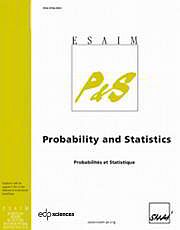Crossref Citations
This article has been cited by the following publications. This list is generated based on data provided by
Crossref.
Kuhn, E.
and
Lavielle, M.
2005.
Maximum likelihood estimation in nonlinear mixed effects models.
Computational Statistics & Data Analysis,
Vol. 49,
Issue. 4,
p.
1020.
Jaffrézic, Florence
Meza, Cristian
Lavielle, Marc
and
Foulley, Jean-Louis
2006.
Genetic analysis of growth curves using the SAEM algorithm.
Genetics Selection Evolution,
Vol. 38,
Issue. 6,
p.
583.
Chafaı¨, Djalil
and
Loubes, Jean-Michel
2006.
On nonparametric maximum likelihood for a class of stochastic inverse problems.
Statistics & Probability Letters,
Vol. 76,
Issue. 12,
p.
1225.
Samson, Adeline
Lavielle, Marc
and
Mentré, France
2006.
Extension of the SAEM algorithm to left-censored data in nonlinear mixed-effects model: Application to HIV dynamics model.
Computational Statistics & Data Analysis,
Vol. 51,
Issue. 3,
p.
1562.
Makowski, David
and
Lavielle, Marc
2006.
Using SAEM to estimate parameters of models of response to applied fertilizer.
Journal of Agricultural, Biological, and Environmental Statistics,
Vol. 11,
Issue. 1,
p.
45.
Allassonniere, S.
Kuhn, E.
Trouve, A.
and
Amit, Y.
2006.
Generative Model and Consistent Estimation Algorithms for Non-Rigid Deformable Models.
p.
V.
Dobigeon, Nicolas
Tourneret, Jean-Yves
and
Scargle, Jeffrey D.
2007.
Joint Segmentation of Multivariate Astronomical Time Series: Bayesian Sampling With a Hierarchical Model.
IEEE Transactions on Signal Processing,
Vol. 55,
Issue. 2,
p.
414.
Dobigeon, Nicolas
and
Tourneret, Jean-Yves
2007.
Joint segmentation of wind speed and direction using a hierarchical model.
Computational Statistics & Data Analysis,
Vol. 51,
Issue. 12,
p.
5603.
Samson, Adeline
Lavielle, Marc
and
Mentré, France
2007.
The SAEM algorithm for group comparison tests in longitudinal data analysis based on non‐linear mixed‐effects model.
Statistics in Medicine,
Vol. 26,
Issue. 27,
p.
4860.
Dobigeon, Nicolas
Tourneret, Jean-Yves
and
Davy, Manuel
2007.
Joint Segmentation of Piecewise Constant Autoregressive Processes by Using a Hierarchical Model and a Bayesian Sampling Approach.
IEEE Transactions on Signal Processing,
Vol. 55,
Issue. 4,
p.
1251.
Lavielle, Marc
and
Meza, Cristian
2007.
A parameter expansion version of the SAEM algorithm.
Statistics and Computing,
Vol. 17,
Issue. 2,
p.
121.
Dartois, Céline
Lemenuel-Diot, Annabelle
Laveille, Christian
Tranchand, Brigitte
Tod, Michel
and
Girard, Pascal
2007.
Evaluation of Uncertainty Parameters Estimated by Different Population PK Software and Methods.
Journal of Pharmacokinetics and Pharmacodynamics,
Vol. 34,
Issue. 3,
p.
289.
Donnet, Sophie
and
Samson, Adeline
2007.
Estimation of parameters in incomplete data models defined by dynamical systems.
Journal of Statistical Planning and Inference,
Vol. 137,
Issue. 9,
p.
2815.
Meza, Cristian
Jaffrézic, Florence
and
Foulley, Jean‐Louis
2007.
REML Estimation of Variance Parameters in Nonlinear Mixed Effects Models Using the SAEM Algorithm.
Biometrical Journal,
Vol. 49,
Issue. 6,
p.
876.
Chenel, Marylore
Bouzom, François
Cazade, Fanny
Ogungbenro, Kayode
Aarons, Leon
and
Mentré, France
2008.
Drug–drug interaction predictions with PBPK models and optimal multiresponse sampling time designs: application to midazolam and a phase I compound. Part 2: clinical trial results.
Journal of Pharmacokinetics and Pharmacodynamics,
Vol. 35,
Issue. 6,
p.
661.
Dobigeon, Nicolas
Tourneret, Jean-Yves
and
Chang, Chein-I
2008.
Semi-Supervised Linear Spectral Unmixing Using a Hierarchical Bayesian Model for Hyperspectral Imagery.
IEEE Transactions on Signal Processing,
Vol. 56,
Issue. 7,
p.
2684.
Donnet, Sophie
and
Samson, Adeline
2008.
Parametric inference for mixed models defined by stochastic differential equations.
ESAIM: Probability and Statistics,
Vol. 12,
Issue. ,
p.
196.
Richard, Frédéric J. P.
Samson, Adeline M. M.
and
Cuénod, Charles A.
2009.
A SAEM algorithm for the estimation of template and deformation parameters in medical image sequences.
Statistics and Computing,
Vol. 19,
Issue. 4,
p.
465.
Martinez, M.J.
Lavergne, C.
and
Trottier, C.
2009.
A mixture model-based approach to the clustering of exponential repeated data.
Journal of Multivariate Analysis,
Vol. 100,
Issue. 9,
p.
1938.
Keller, Merlin
Lavielle, Marc
Perrot, Matthieu
and
Roche, Alexis
2009.
Medical Image Computing and Computer-Assisted Intervention – MICCAI 2009.
Vol. 5762,
Issue. ,
p.
450.


